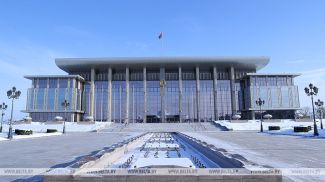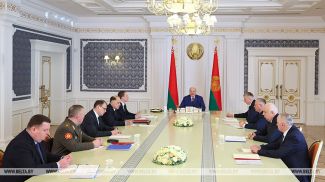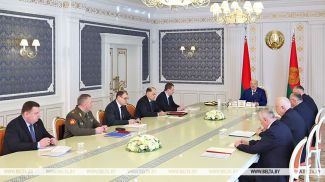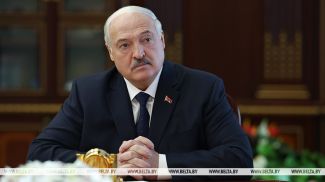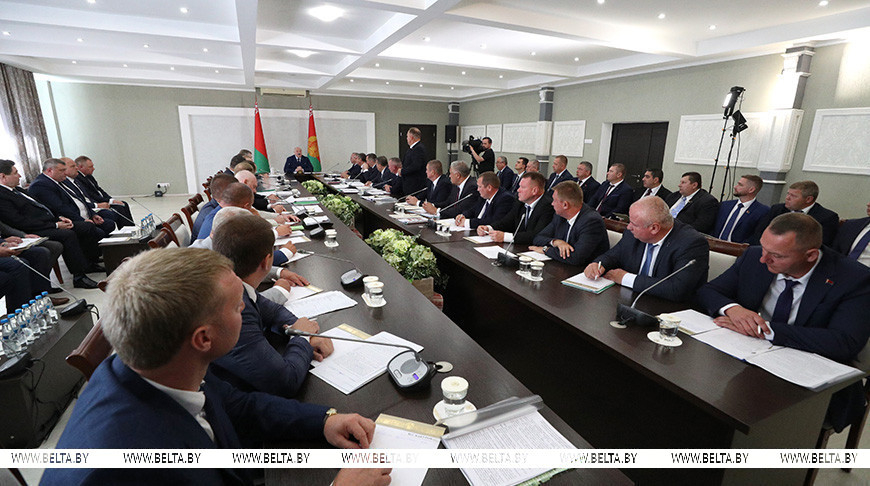
SHKLOV, 9 August (BelTA) – Today’s discussion will focus on order and further reforms in agriculture. Belarus President Aleksandr Lukashenko made the statement during his working trip to Shklov District on 9 August, BelTA has learned.
In Shklov the head of state convened a meeting to discuss effective development of agricultural production in Shklov District and Orsha District. However, Aleksandr Lukashenko said at the very beginning of the meeting that the issue would be considered at the national scale. “The topic for today’s discussion is order and further reforms in agriculture,” the president said.
A more prominent role for heads of district administrations
One of the issues raised by the head of state during the working trip to Shklov District was the role of heads of district administrations. The legal and regulatory framework of their work and a clear understanding of their powers and the responsibility area were mentioned. “I think you have questions for us. For me,” Aleksandr Lukashenko said.
The head of state noted that for all intents and purposes Belarus lacks a regulatory act on the chairpersons of district executive committees that clearly addresses the relevant matters. “But they need to be able to open a book and read all about their authority and functions,” the president noted.
He explained that then it would be understandable for everyone what the heads of district administrations can demand and from whom and there would be no disputes concerning subordination and competence limits.

Sources of revival of agriculture
Speaking about the development of agriculture, the president reminded how it all started at the dawn of Belarus’ establishment as an independent sovereign state. The first program on reviving or essentially rebirthing the countryside was a logical continuation of the first election program of Aleksandr Lukashenko. Leading the country away from the precipice was the key message. Providing people with food was quite an acute problem back then since food was in short supply and many of the foods were available only in exchange for coupons.
“This is why a simple vital task was formulated: to feed the people,” the head of state recalled. In his words, the lack of spare financial resources prevented the state from passing the countryside revival program right away. “Certain resources were needed in order to revive agriculture and thus feed the people,” he said.
Another serious direction that was in focus back then is the mobilization of people, who experienced serious confusion in those years. Errors were unavoidable during the initial stage. The experience of setting up private farms when land was cut into pieces was available. However, even back then large agricultural fields where collective farms were based were preserved. As time demonstrated, this decision was the right one. Because the need of merging a number of agricultural enterprises in order to make them larger is under consideration now. Many neighboring countries follow this approach as well.
A number of programs on agriculture have been implemented in Belarus. A serious foundation for the development of agriculture has been created, particularly in Shklov District and Orsha District. The new head of the Shklov District Executive Committee Sergei Bartosh confirmed it when he arrived at the location. As a former agriculture and food minister he has a lot to compare things with. In his words, the district has magnificent basis for agriculture.

Reasons against complacency
Summing up what has been done in the previous period, the president stressed that it totally does not mean that one can rest on their accomplishments now. “We’ve led the nation away from the precipice. We’ve fed it, clothed it, and so on and so forth. Can we calm down? No,” Aleksandr Lukashenko stated. According to the president, during the conference it is necessary to determine future steps on improving and developing agricultural production.
Two GDP-generating districts as beacons
The head of state explained why close attention was concentrated on two districts. The head of state knows Shklov District well due to previous work experience. This is why changes were implemented there under his supervision in order to replicate the experience onto other regions later on. Agricultural enterprises were chosen to act as beacons, which other agricultural enterprises could learn from and which practices they could repeat.
“I believe that Orsha District is the most promising one in Vitebsk Oblast. The way it works is unacceptable,” Aleksandr Lukashenko referred to the second district, which was mentioned during the government conference. The region boasts a solid base with a good range of agricultural products, including even pedigree animal husbandry.
“They know how to do everything over there. Considering this foundation, the way it has been developing for the last few years is unacceptable,” the president stressed.
In his words, these two districts should be used as examples in order to determine the next steps on modernization and on developing agricultural production and the countryside as a whole. They can become kind of examples for others to follow but not every agricultural enterprise in the country should mimic them. For instance, a number of Grodno Oblast districts have already determined what agricultural complexes they need. As the strategy for developing Shklov District and Orsha District is getting shaped, it is important not to destroy what other districts have already created. Efforts should be focused primarily on reducing things to order, getting the most out of capital outlays, and on ensuring technological discipline and performance discipline.

During the meeting Aleksandr Lukashenko emphasized the need to address a very important issue - to determine the methods of improving the efficiency of agricultural production in the two gross-forming districts.
The discussion initially focused on Orsha. The region received an impetus for development in late 2018 when the president signed Decree No.506 “On the development of Orsha District” with a view to improving people’s living standards and their quality of life.
A five-year accelerated development program was adopted to cover almost all areas of production and social sector. “The project is exemplary. We used the program-targeted method. We determined integration elements,” Aleksandr Lukashenko said.
The president stressed that all the necessary resources had been allocated and over Br1 billion had been invested in Orsha District’s agribusiness. “The district got a new lease on life. Wages were increased. The outflow of personnel slowed down. It only slowed down,” the head of state pointed out the positive effect.
Shortcomings were also mentioned. Not all the steps and measures envisaged by the program have been implemented. A number of production and financial targets have not been hit. In particular, the district failed to hit performance targets concerning cereals and flax. New processing capacities remained underutilized. A number of farms still do not have enough cattle.
“I think you will have to work hard to bring this program to its logical conclusion,” Aleksandr Lukashenko said.
Speaking about Shklov District, the president pointed out that integration processes are also underway in the region. There are ten agricultural enterprises in the district, although there were about 30 of them in Soviet times. “The chairman of the district executive committee has to establish good relations with the heads of these ten farms and work, help each other,” Aleksandr Lukashenko instructed.

The largest agricultural enterprises in the district are Kupalovskoye and enterprises of the Belarus President Property Management Directorate - Aleksandriyskoye and ASB-Agro Gorodets.
The head of state recalled that instructions to get things in order in Kupalovskoye, which in addition to the managing company also includes three other agricultural enterprises, had been given just over five years before. “I know that there were a lot of controllers and inspectors here, but systemic problems have barely moved off the dead center,” he noted.
Some increase in gross output, milk and cattle was registered in 2024 in comparison with 2023. More haylage and grass fodder was harvested. However, it is necessary to look at their quality in addition to figures on paper, the president said. After all, even with such results, cattle death losses in all agricultural enterprises of the holding company have almost doubled. There is a personnel shortage. There are not enough veterinary specialists. Debts are piling up.
“You failed to get back in the black following the first stage we outlined then. There is a decent base over there,” the head of state concluded.
As for OAO Aleksandriyskoye, the president said that considerable resources have been invested in the enterprise (almost Br40 million to repay investment loans, purchase grain, fertilizers, and cover other needs). But the problems remain virtually the same as those of Kupalovskoye: reduction of poultry stock, reduction of egg production, increase in cattle mortality.
Meanwhile, the region has preserved a high culture of soil cultivation since the Soviet times – not all the western regions can boast such a level of cultivation. In view of the fact the head of state reasonably criticized the leaders of Mogilev Oblast and Minsk Oblast: “Isachenko’s fields are not plowed properly. The same is true for the Minsk Oblast governor: the fields from Borisov to the Berezinsky Biosphere Reserve are empty. One starts wondering, Leonid Konstantinovich [Zayats], why do we engage in land reclamation? They do not plow the fields that should be plowed today, which means we are heroically expanding the land through reclamation while losing the same amount of hectares on the land that needs no reclamation.”
The president instructed the heads of the oblast and district executive committees to have all necessary land plots plowed.

Returning to the matter of development of OAO Aleksandriyskoye, Aleksandr Lukashenko recalled his instructions to the Belarus President Property Management Directorate to team up with scientists and work out a clear and understandable concept of further development.
“It should be a concrete, and most importantly, realistic plan of measures. It needs technological maps, elaborated tasks, a detailed forecast on the prospects for every field and processing facility,” the president stressed.
Mistakes are inadmissible
According to the head of state, all heads of agricultural enterprises of Orsha District and Shklov District have been specifically invited to participate in the meeting. “It is necessary to discuss everything in detail and make final decisions,” Aleksandr Lukashenko outlined the task.
The president warned against any mistakes in the implementation of the measures: “Because a huge amount of money is at stake and we have no extra money.” Aleksandr Lukashenko emphasized that, for example, agricultural complexes had been built in Orsha District and this experience can be and should be replicated in Shklov District.
“There is this foundation. It is necessary to follow this trend. We have already exhausted the potential of obvious solutions and earned $8 billion in exports. It is a large amount of money, no other economy branch gives so much. All of that has been exhausted. It is now necessary to focus on technologies. Technological discipline and executive discipline should be prioritized. Without it don't even start investing in it. That is why before asking for money, applying to banks, to the government, and especially to me, prove that every ruble you invest will come back tenfold,” the Belarusian leader said.
Integration, larger agricultural enterprises, and discipline
The head of state drew attention to a number of aspects of fundamental importance.
The first one concerns continued integration of agricultural producers and the creation of large companies with a complete production cycle. “It should be done where it is needed,” the president emphasized. “Where it is necessary,” the president emphasized. “If an individual agricultural enterprise like Gorodets, Gastellovskoye, Voskhod and the other good and small enterprises can operate on their own, let them work”.
If an agricultural enterprise itself grows and comes to realize that the available lands are insufficient, then the state would welcome a merger. “This is why you should look for spare land together with the oblast governor in order to attach them to this agricultural enterprise and get a larger effect. We know that things will work out over there,” Aleksandr Lukashenko noted.
At the same time the president cautioned against forced mergers. Decisions need to be made on the spot bearing in mind the situation. “Don’t ruin it by merging it with some weak agricultural enterprise. It will weigh heavily on the good one,” the head of state pointed out. “Honestly speaking, I don’t like big agricultural enterprises. But I can see the trend [in favor of big ones]. But you shouldn’t make anything artificial.”
“You should be careful with integration,” the head of state said. “Be careful when merging and separating farms. It needs consultations on the ground. We need to take into account the experience of the past and possible future developments.”
The second important aspect, which the president mentioned, is that merging should take place on the basis of well-performing agricultural enterprises with clear and understandable specialization.
Thirdly, transformations should be implemented with strict observance of all technologies, a good raw material base where the smallest details are accounted for, and strict discipline.
Aleksandr Lukashenko emphasized that not only chairpersons of district executive committees and oblast governors will be responsible for the result. “Specialists from executive committees, ministries, the central government, the Belarus President Administration, the Belarus President Property Management Directorate and the Academy of Sciences should be assigned to every project, organization, field, farm, and other objects of the program,” the head of state said.




